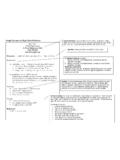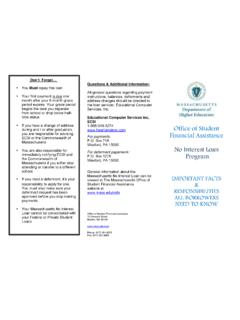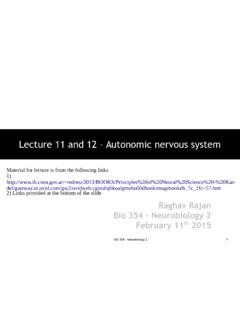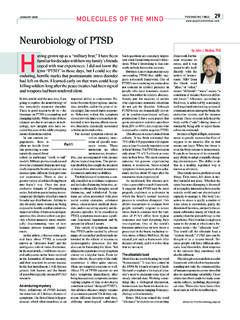Transcription of Handouts for Training on the Neurobiology of Trauma
1 Handouts for Training on the Neurobiology of Trauma Jim Hopper, April 2016 Handout 1: How to Use the Neurobiology of Trauma Responses and Resources Note: In order to effectively use these answers, please take the person s individual needs and circumstances into consideration PRIOR to using these responses (in other words, please customize when needed.) Step 1: Make sure you have established rapport and trust with the person. This process typically takes time and always involves validating the person s experience, learning about the person s needs, and building mutual trust. Step 2: After rapport is built, and someone asks a question that could be answered, in part, with some information on the Neurobiology of Trauma (see Handout 2), you may use a response like: Option 1: It s understandable that you are feeling this way. Many people who have experienced _____ feel _____ [avoid identity labels like victim and survivor ]. If you would like, I can provide you with some basic information about why our brains and bodies react that way.
2 Option 2: It is very common for people to _____ when they are being assaulted [or their words for what happened]. If you would like, and if you are open to it, I can provide you with some more information about this. Option 3: It sounds like _____ has been difficult for you. It is very common for people who have experienced _____ to feel/think this way. If you are okay with it, I can provide you with some background information about why our bodies and brains react that way. Step 3: If they do consent to discussing the Neurobiology of Trauma : You may proceed to use the Neurobiology of Trauma responses (see Handout 2). If they do not consent to discussing the Neurobiology of Trauma : Please refrain from using the Neurobiology of Trauma responses. Instead, provide the person with emotional support and resources (from the dashboard), as applicable. 2 2 Step 4: If the person wants to read/obtain additional information and/or resources related to the Neurobiology of Trauma , you can respond with: Are resources to help with _____ something that you may be interested in?
3 If so, I have a few resources that I can provide you (provide Handouts ). Step 5: If person wants additional information that is beyond the scope of this Neurobiology of Trauma Training and the provided responses, you may respond with: I can understand your wish to learn more about these concepts. I have only been trained on the basic concepts of how Trauma affects our bodies and our brains. But there are several resources that may be able to provide you with the answers you are looking for. If this is something you may be interested in, I have a few referrals I can provide you (see Handout 3). 3 3 Handout 2: Responses to Frequently Asked Neurobiology of Trauma Questions Disclaimer: These responses are provided to help you answer a person s frequently asked questions from a neurobiological perspective. To effectively use these responses, please take the person s individual needs and circumstances into consideration PRIOR to using them.
4 1. Why didn t I fight back? During an assault, the brain s fear circuitry takes over. It can trigger survival reflexes that don t involve fighting or even struggling. Those responses are automatic and normal in such situations. Followed by: There are a few common reflexes that the brain falls back on during an assault situation. For example, you may freeze, space out, pass out, become paralyzed and unable to move or speak, or become faint or even pass out. Or someone may panic and try to resist, but perpetrators often expect this and easily counter the resistance. 2. Why can t I just get over it? There could be many reasons for that and all of them are completely normal. It s based on how your brain responds to a sexual assault, especially in situations where there are many other stressful things going on. Followed by: i. Traumatic memories are different from normal memories. They are strongly encoded or recorded into the brain even if you only remember pieces of the experience.
5 Many people continue to struggle with the memories, especially if they have not gotten the support that they need and deserve. 3. Why do I sometimes feel like it s happening all over again? Traumatic memories are different from normal memories. They are strongly recorded in the brain because of the stress chemicals that are released during the Trauma . Even if your memory is incomplete, and you remember just pieces of what you felt and went through, it can feel like scenes of a movie playing in your head. Followed by: These movie scenes , which can contain really traumatic memories, can get triggered by things and situations that we don t expect or we can t control. So, sometimes, no matter how much you try to avoid the traumatic memories, they can come up without warning and they can feel just as intense as when the assault was actually happening. 4 4 Or: You may feel like it s happening all over again because your body will react to the triggers the same way it reacted to the assault as it was happening.
6 For many people, working with a trained professional who specializes in Trauma can end these feelings. 4. Why am I so easily startled? ( why am I so jumpy?) Sexual assaults and other traumas affect the part of the brain that controls the startle response. This part of the brain is linked to anxiety and the effects can be lasting. But it is also true that the startle response can be reversed. Followed by Anything you can do to develop a sense of safety in your body and an awareness of your emotions may help to reduce how jumpy you feel. You can try to achieve this by using exercise, yoga, and meditation. Also, many people choose to seek help from a trained professional to help them reduce and eliminate this startle response . 5. I ve tried counseling before but it didn t help. So what do I do now? First, try to obtain more information about their previous experience(s) with counseling. Use questions like: i. Can you tell me a little more about your past experience with a counselor?
7 Ii. Would you mind telling me a little more about your past counseling experience so that I can provide you with other resources that may be helpful to you? Then, based on the person s answers, you may state: i. There are a variety of treatments that can help people who have experienced sexual assault heal. Also, some therapists are more effective than others. Some clinicians are simply a better match for some clients than others. ii. I encourage you to not to give up on finding the help you deserve. There are professionals who can help you. Lastly, ask about their experiences with and attitudes towards exercise, yoga, and meditation. Provide them with suggestions such as: i. Many people who have been sexually assaulted have found exercise/yoga/meditation very helpful, especially when they are trying to develop a sense of safety and comfort their bodies. These techniques can affect a specific brain region that allows you to be more aware of your bodily experiences.
8 That awareness can be used to support your healing process. 5 56. Why did I feel like I couldn t move? [You may already have heard one of these responses in their account of what happened. If so, refer to that, in their words, while providing the information below.] There are actually terms that describe what you may have experienced. One is called tonic immobility . That basically means that your body went rigid and you couldn t move that is, were paralyzed with fear. Another is collapsed immobility . In this case, one feels faint and the body goes limp (like a possum), and one may even pass out. These reflexive responses can happen when someone is unable to escape, or they believe they are unable to escape, an assault. It s a response that appeared millions of years ago in evolution, and all mammals can have that type of response. Followed by: The fact that you couldn t move does not mean that _____ (insert whatever is most applicable to the person s experience such as: that you did anything wrong; that you wanted to have sex; that you are weak; that you deserved what happened because you didn t fight back).
9 It s just that your brain went into extreme survival mode. This mode is designed to prevent the perpetrator from becoming even more violent. 7. Why do I feel numb and disconnected from other people? Feeling connected to other people, including those we love, requires being able to feel emotions. It requires us to feel positive emotions of happiness, love, and caring. Feeling connected also requires us to feel motivated to connect with others. A traumatic experience can change the brain areas that enable you to feel these types of emotions. Followed by: In other words, traumatic experiences can affect your ability to connect with others or to have positive and loving feelings. These numbing symptoms are common for people who have been sexually assaulted and other traumas. 8. Why am I drinking or using drugs? ( addiction) First, it s important to ask why they think they are drinking and using drugs, as it may or may not be related to their sexual assault Trauma .
10 Then, you can build on their experience to respond appropriately. Here are some sample responses, worded from a neurobiological perspective: i. Whenever the brain is having unwanted and unpleasant experiences, it can t help but seek relief and escape from those experiences. There is actually a seeking circuitry of the brain. This circuitry seeks things that are healthy and 6 6fulfilling. But it can also seek quick fixes that are unhealthy and potentially addictive. ii. When people are really hurting, and they don t have or can t make use of support and help from others, their seeking circuitry can get caught up in using substances to get relief. iii. Alcohol and different drugs have specific effects on the brain. Some of those effects offset symptoms such as depression and anxiety. So it is very common for people who have been sexually assaulted and are traumatized to self-medicate with alcohol and drugs, in attempt to find relief, even if it s only temporary and leads to other problems.



















![Neurobiology of Addiction presentation [Autosaved]](/cache/preview/a/c/c/6/9/8/f/8/thumb-acc698f8aa428f97a971250b5c81102d.jpg)